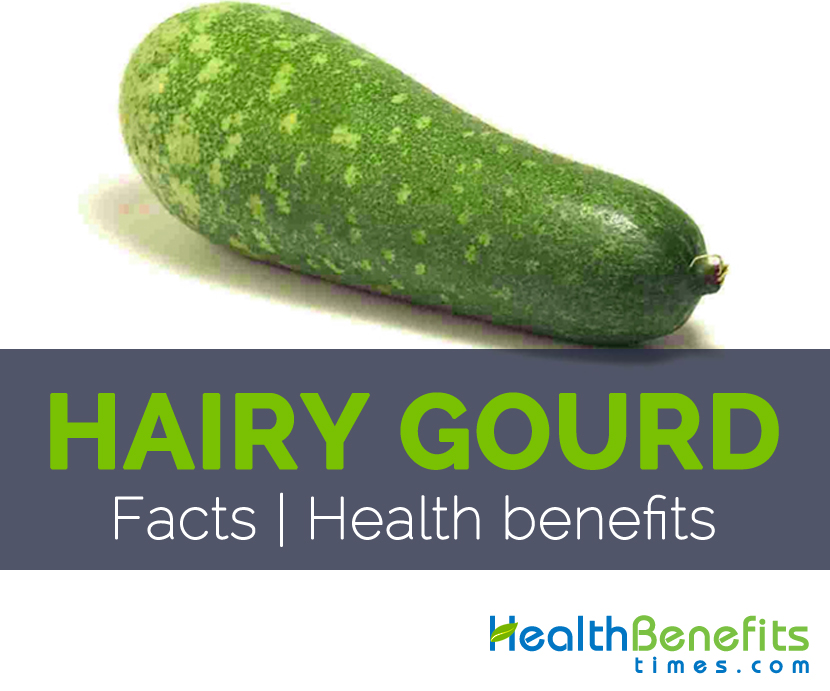Plant
Hairy Gourd is an annual creeping vine along with branched tendrils found growing in a temperate, warm climate. It normally prefers fertile, organically rich, medium moisture, well-drained loams soil. It has prominently-furrowed, coarse, thicker, hairy stems. Leaves are big, roughly-textured, 5-lobed leaves (4-10″ long). Flowers are bright yellow, 6–12 cm across similar to that described for wax gourd.
Fruit
Hairy gourd is oblong cylindrical, dumb-bell-shaped (narrowed in the center) fruit, 15–23 cm in length and 5–10 cm across with roundish end and covered by thick, bristle-like white trichomes onto the surface. Fruits are usually green to dark green with pale green speckles and very much smaller and lighter than the wax gourd. Flesh in white in color and has got mild subtle flavor somewhat like a cucumber or summer squash. It has a delicate, almost bland taste suitable for many food dishes.
History
Although origin of Hairy gourd is uncertain, but Indo China and India are considered to be the centers of greatest diversity. Hairy gourd is broadly grown in China since 500 AD and is widely cultivated in Southeast Asia and throughout the world.
Nutritional Value
Apart from its delicate, almost bland taste hairy gourd is a good source of nutrients, vitamins and minerals. Consuming 100 gram of Hairy Apple offers 69 mg of Vitamin C (Ascorbic acid), 0.07 mg of Vitamin B1, 0. 250 mg of Potassium, 1.7 g of Total Dietary fiber, 0.05 mg of Vitamin B2 and 0.3 mg of Iron.
Health benefits of Hairy Gourd
1. Improves Physical Performance
Vitamin C presents in Hairy gourd form a very effective defensive line against improving physical performance. The antioxidant and anti-inflammatory properties of hairy gourd have been linked to physical performance and muscle strength particularly in older people. It may be hard to believe, but a single serving of Hairy gourd can contain 76.67% of your daily requirement for vitamin C. The high levels of essential vitamins found within Hairy gourd make it a very important part for improving physical performance. It has been discovered that vitamin C doses of 1,000 to 2,000 mg per day might decrease the production of histamines that contributes to inflammation in asthmatic people, and can consequently help to improve asthma symptoms.
2. It Can Help Treat Certain Types of Disease
Vitamin B1 rich foods are used to treat the people suffering with Alcoholism. Apart from improving the mood, vitamin B1 can also help alcoholics kick their dependency. Hairy Gourd intake helps to fight off various other types of disease as well. Different scientific research recommends using Vitamin B1 if case you are suffering from congestive heart failure. Vitamin B1 present in Hairy Gourd helps to fight off things like seasickness, and work like an antioxidant within the body. Lastly consuming Hairy gourd helps to produce red blood cells in your body to fight infection and disease. A single serving of Hairy gourd contain 5.83% of your daily requirement for vitamin B1.
3. Immune System Health
Hairy gourd is a main source of several nutrients, including magnesium, vitamin C as well as other antioxidant compounds. These minerals and vitamins are significant antioxidant components in the body that help to neutralize free radicals all through the body. Free radicals are actually natural, dangerous byproducts of cellular metabolism, and they have been associated with a wide band of illnesses, including heart disease, cancer and premature aging. Furthermore, Hairy Gourd contains Beta Carotene. All of this together helps the body to boost its immune response as well as protect from the external substances, as well as the free radicals produced by our own body, that might do us harm over the long term.
4. Blood pressure and cardiovascular health
High blood pressure and cardiovascular disease is very much related to lower potassium intakes. Many of us are aware that maintaining a low sodium intake is vital to lower blood pressure, but make sure a good consumption of potassium is equally important. Hairy gourd consists of minimal amount of Potassium, yet consuming hairy gourd regularly can help to fulfill the potassium requirement of the body.
Research suggests increasing potassium intake and decreasing sodium is one of the most important dietary change that help people to reduce the chance of cardiovascular disease. Another research recommends consuming 4,069 mg of potassium each day to have 49% lower chance of death by ischemic heart disease when compared with those people who consumed much less potassium.
5. Fiber steadies your blood-sugar level
Fiber particularly soluble type which can be found in legumes, bran and psyllium helps to slow the absorption of sugar from intestines. This steadies the blood sugar level and minimizes the ups and downs of insulin secretion. Therefore breakfast and lunch containing moderate amount of soluble fiber such as Hairy gourd, fruits can be particularly valuable to a child who shows behavior and learning problems from blood sugar swings. Maintaining lower insulin level helps body to store less fat, another bonus for people trying to manage their weight through the benefits of fiber. A single serving of Hairy gourd contain 40475.83% of your daily requirement for Potassium.
6. Treatment of Cancer
Vitamin C, or Ascorbic acid, is one of the most effective and safest nutrients. It is a water soluble vitamin and is powerful antioxidant for the synthesis of collagen that helps to make blood vessels as well as body muscles robust. Vitamin C is also equally important for protection from different forms of cancer. Hairy gourd consists of considerable amount of vitamin C, so intake of Hairy gourd is linked to the minimized chances of cancer. Different research have concluded that increased consumption of vitamin C rich Hairy gourd is associated with a reduced chance of cancers of the mouth, vocal chords, lungs, esophagus, throat, colon, stomach and rectum.
How to eat
- Immature and mature but not ripe fruit is picked for cooking after peeling the skin.
- Firm flesh is sliced and use in stews, soups, stir-fry on its own or with fish, meat or other vegetables.
- The gourd is often cut into half, hollowed it out and stuffed with meat (beef or pork), mushrooms and shrimps then steamed in a pot or even fried.
- A Taiwanese recipe recommends shredding and frying with chilies.
- Firm flesh of the mature fruit is candied with sugar and can be dried for future use.
- Young shoots, flowers and leaves are sometimes consumed as vegetable as for wax gourd.
- By frying or roasting, the seeds are prepared as a snack food.
Other Traditional uses and benefits of Hairy Gourd
- In Ayurveda, Fruit is helpful for the management of a host of medical problems, including lung diseases, cough, epilepsy, asthma, internal hemorrhage and urine retention.
- It is also an excellent medicine for tapeworms.
Comments
| Hairy Gourd Quick Facts | |
|---|---|
| Name: | Hairy Gourd |
| Scientific Name: | Benincasa hispida |
| Origin | Origin is uncertain but Indo China and India are regarded to be the centres of greatest diversity. |
| Colors | Green to dark green with pale green speckles |
| Shapes | Oblong cylindrical, dumb-bell-shaped (narrowed in the center), 15–23 cm long and 5–10 cm across with roundish end |
| Flesh colors | White |
| Taste | Delicate, almost bland taste |
| Calories | 11 Kcal./cup |
| Major nutrients | Vitamin C (76.67%) Vitamin B1 (5.83%) Potassium, K (5.32%) Dietary Fiber (4.47%) Vitamin B2 (3.85%) |
| Health benefits | Improves Physical Performance, Help Treat Certain Types of Disease, Immune System Health, Blood pressure and cardiovascular health, Steadies your blood-sugar level, Treatment of Cancer |
| More facts about Hairy Gourd | |
| Rank | Scientific Name & (Common Name) |
|---|---|
| Kingdom | Plantae (Plants) |
| Subkingdom | Tracheobionta (Vascular plants) |
| Superdivision | Spermatophyta (Seed plants) |
| Division | Magnoliophyta (Flowering plants) |
| Class | Magnoliopsida (Dicotyledons) |
| Subclass | Dilleniidae |
| Order | Violales |
| Family | Cucurbitaceae (Cucumber family) |
| Genus | Benincasa Savi (Benincasa) |
| Species | Benincasa hispida (Thunb.) Cogn. (Waxgourd) |
| Synonyms |
|





